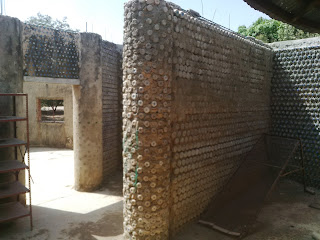In the northern state of Kaduna, the compound of a non-governmental organisation known as the Developmental Association for Renewable Energies (DARE) is littered with thousands of used plastic bottles.
Across Nigeria's cities and villages, waste including plastic bottles and other non-biodegradable materials, end up at dump-sites and landfills or on streets often clogging drains and waterways.
But DARE has found an innovative use for plastic bottles, building houses as part of a renewable energy project.
The bottles are first filled with sand and then arranged in rows and linked together with string and a mixture of cement and clay to hold them in place.
Yahaya Ahmed, an environmentalist and the chairman DARE says apart from helping to save the environment, the bottle houses will also solve some of Nigeria's housing problems.
With a population of nearly 170 million, majority of Nigerians live in poverty in shanty towns or in basic concrete block and iron-roofed houses they have built themselves.
"I think it is sustainable, we can really really recreate a lot of jobs for our many many youths who first of all have not had the opportunity of having very good education or even those who have their degrees and are unemployed. But those who are even below, we have a lot of them and such simple technology can really absorb a lot of them so that we have less and less idle youths on the streets," he explained.
For a two bedroom flat complete with kitchen, toilet and bath, about 14,700 bottles of 0.75 litres will be used.
Siiba Ahmed, bottle house builder has been building bottle homes for the last three years. He hopes to one day soon construct his own house for his family.
"Before I learnt this work, I was a photographer before. So this my brother invited me to come and learn this work so that I can improve. So I came here and used about six months to learn this work. So after that if he gets another contract he will call me. We will build another one at Zaria after this one. And after that we will go to Kano and build our own house. So I am the first person to build this type of building in Kano," said Ahmed.
The bottle houses are not only cheaper than the brick one but also better suited for Nigeria's hot climate.
Temperatures inside the house stay low because the sand insulates them from the heat.
The project also aims to provide jobs for many unemployed young people.
"I think it is sustainable, we can really really recreate a lot of jobs for our many many youths who first of all have not had the opportunity of having very good education or even those who have their degrees and are unemployed. But those who are even below, we have a lot of them and such simple technology can really absorb a lot of them so that we have less and less idle youths in the streets," said DARE Chairman, Yahaya Ahmed.
Sammail Ismail has lived in his own bottle house for almost three years now. His old house was made of wood and would collapse during the rainy season. He says the bottle house is much stronger.
"It is not comparable because for instance if you take one block of bottle brick, when you compare with a block...cement block, it can easily break the block but this one, if you take a hammer you cannot break it," he said.
To provide more affordable houses for Nigerians, DARE plans to build its first complete estate of 30 units of two to three bedroom flats.
Pictures courtesy Seun Sanni
Link to the video:
Nigerians turn disposable plastic bottles into affordable housing
Link to the video:
Nigerians turn disposable plastic bottles into affordable housing






No comments:
Post a Comment